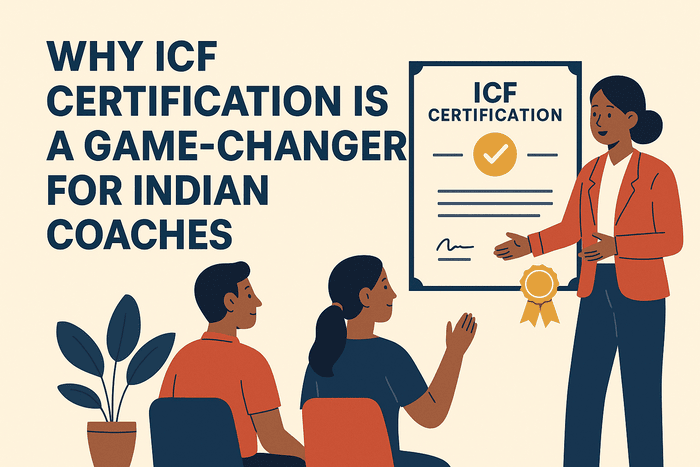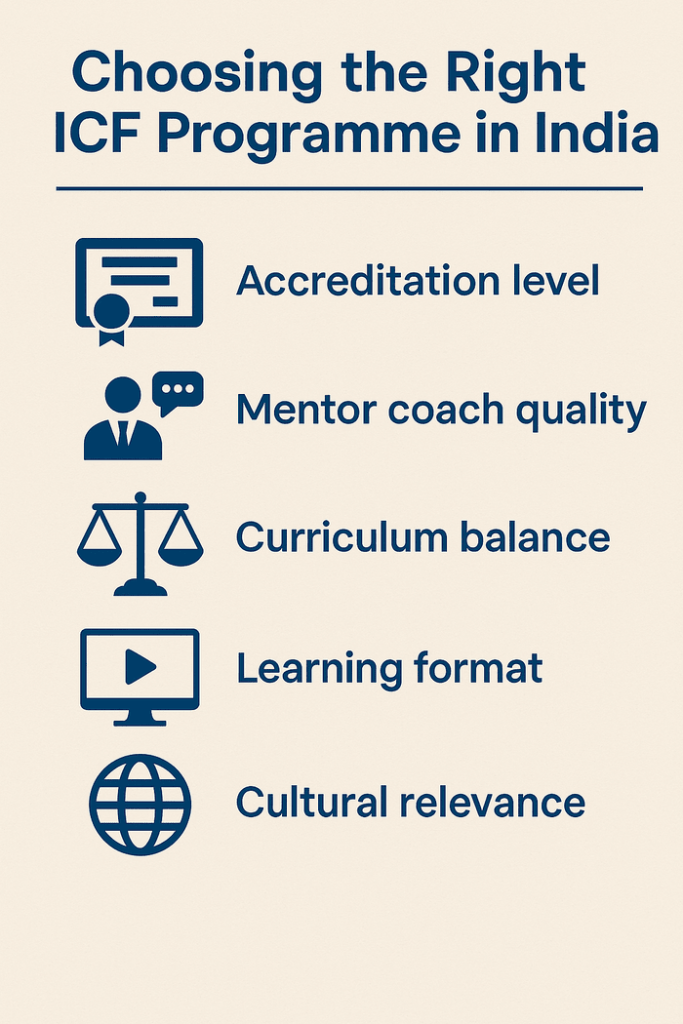
The coaching profession has moved from the margins to the mainstream. Recent global studies show that the number of professional...
The coaching profession in India is booming. Start‑ups, Fortune 500 companies and government organizations now hire coaches to help leaders navigate rapid change and develop people‑centric cultures. Alongside this growth, clients have become more discerning: they want more than motivational pep talks; they expect coaches to adhere to global standards and deliver measurable results. This is where certification with the International Coaching Federation (ICF) becomes a game‑changer.
More than a badge on your profile, an ICF credential is an assurance that a coach has completed rigorous training, adheres to an ethical code and demonstrates competency in a set of universally recognised core skills. In a global survey, around 80 % of coaches said their clients expect them to be certified. For Indian coaches operating in a crowded, largely unregulated market, being able to meet this expectation differentiates them from the multitude of self‑styled “life coaches” on LinkedIn (where less than 1.25 % of coaches are actually credentialed).
This guide explores why ICF certification matters in the Indian context, outlines the benefits and requirements of each credential level, and provides a step‑by‑step path to getting certified. You’ll see how an ICF credential can elevate your practice, expand your network and ensure you operate with integrity and professionalism.

India’s economic liberalisation and the tech boom of the 1990s created a new breed of professionals hungry for growth. Over the past decade, leadership and personal development coaching have exploded in popularity. Start‑ups use coaches to help founders articulate their vision and build resilient teams; established corporates hire them to support digital transformation; professionals seek career coaches to navigate transitions. Yet, this rapid growth has also led to inconsistency in quality. Anyone can claim to be a coach, and there are no national licensing requirements.
This gap has prompted many organisations to look for internationally recognised credentials when hiring coaches. The International Coaching Federation, founded in 1995, became the de facto global body that sets industry benchmarks. According to ICF, the federation represents over 57,000 members worldwide and aims to advance coaching excellence, impact and value across societies. While global membership numbers may change, the organisation’s mission—to uphold coaching standards and improve coaching impact—remains constant.
ICF is a non‑profit professional body that defines coaching ethics, core competencies and credentialing pathways. It sets standards similar to how the Bar Council regulates lawyers: only those who meet its training and experience requirements can use its credentials.
ICF membership signals commitment to professionalism. Coaches who earn credentials are required to complete accredited training hours, log supervised coaching experience and commit to continuing education. The ICF also enforces a strict code of ethics covering confidentiality, conflicts of interest and client well‑being. For clients, this code is reassurance that they can trust their coach to act in their best interest; for coaches, it provides guidance and protection when navigating ethical dilemmas.
Globally, ICF credentials are recognised by corporations, NGOs and government agencies. In some countries, organisations will only contract coaches who hold ICF credentials or equivalent. In India, multinational firms often adopt the same standard, meaning that ICF certification opens doors to corporate coaching assignments that an uncertified coach may never access.
The data tells a compelling story. According to the Simply.Coach 2025 industry report, 80 % of coaches believe their clients expect them to hold an ICF credential. The report highlights that certification:
Despite these benefits, only about 1.25 % of the four million coaches on LinkedIn are credentialed. For Indian coaches, this gap is an opportunity: by pursuing an ICF credential, you join a select group that signals quality and professionalism in an otherwise crowded marketplace.
ICF‑accredited training isn’t just about passing an exam; it transforms how you coach and how clients perceive you. Based on insights from Regal Unlimited’s article on the advantages of ICF certification and feedback from credentialed coaches, here are ten benefits:
ICF offers three main credential levels: Associate Certified Coach (ACC), Professional Certified Coach (PCC) and Master Certified Coach (MCC). Each level requires a combination of training hours, coaching experience and performance evaluation.
Level | Training hours | Coaching experience hours | Focus and notes |
|---|---|---|---|
ACC (Associate Certified Coach) | Minimum of 60 hours of coach‑specific training | 100 hours coaching experience | Provides foundational skills and ethics. Suitable for new coaches or internal corporate coaches. |
PCC (Professional Certified Coach) | Minimum of 125 hours of training | 500 hours coaching experience | Emphasises advanced skills, deeper coaching presence and more complex client scenarios. |
MCC (Master Certified Coach) | Minimum of 200 hours of training | 2,500 hours coaching experience | Reserved for highly experienced coaches who demonstrate mastery of all ICF competencies; requires rigorous performance evaluation. |
These requirements may evolve over time, so it’s best to consult the ICF website for the latest guidelines. All levels require working with a mentor coach and passing a performance evaluation to demonstrate competency.
With a growing number of providers, selecting the right programme is crucial. Consider the following when evaluating training options:
Organisations like Regal Unlimited offer ACC/PCC courses that blend theory, practice and personal transformation. Their curriculum includes core competencies, ethics, supervised mentoring and a strong community of coaches. Flexible weekend sessions are helpful for working professionals. When comparing programmes, ask about their alumni network, mentor credentials and post‑training support.

Certification is only the beginning. To truly leverage your ICF credential, embed the federation’s core competencies into your daily practice:
Myth 1: Certification is just about paying for a credential. This misconception overlooks the rigorous training, practice and evaluation required. Certification demands time, dedication and continuous learning.
Myth 2: Coaching is a Western concept that doesn’t apply in India. Coaching is about unlocking potential, which transcends geography. Indian companies that integrate coaching see improvements in communication, leadership effectiveness and employee engagement. Accredited programmes are increasingly contextualised for the Indian market.
Myth 3: I can learn coaching skills on my own. While self‑study is valuable, without feedback from experienced mentors you may reinforce bad habits or ethical blind spots. A structured programme provides mentorship, supervision and accountability.
Myth 4: Certification guarantees clients. Credentials open doors, but business development still requires marketing, networking and delivering great results. Building a thriving practice involves continuous learning, self‑promotion and leveraging your network.
To illustrate the transformative power of ICF certification, here are two composite examples (details adapted to protect confidentiality):
Background: An experienced corporate trainer from Bengaluru felt that her workshops were inspiring but lacked long‑term impact. She wanted to support managers beyond the classroom.
Journey: She enrolled in a Level 1 ICF programme, logging 60 hours of training and 100 hours of coaching practice. Working with a mentor, she learned to shift from teaching to coaching—asking instead of telling, listening deeply and challenging assumptions. After earning her ACC credential, she positioned herself as an executive coach and secured contracts with two multinational companies.
Outcome: Her clients reported improved team performance and higher engagement. She increased her rates by 40 % and now delivers both training and coaching, creating a more sustainable income stream.
Background: A Mumbai‑based HR leader wanted to create a coaching culture within her organisation. She had informal coaching conversations but felt she lacked structure and credibility.
Journey: She chose a PCC programme to deepen her skills. The 125 hours of training covered advanced competencies and ethics. She practised coaching colleagues and executives, logging 500 hours. Mentorship helped her refine her presence and avoid giving advice.
Outcome: After obtaining her PCC credential, she established an internal coaching programme, training a cohort of managers on coaching skills. Employee engagement scores improved, and turnover decreased. Externally, she began accepting referrals as a leadership coach, supplementing her income and expanding her professional network.
In India’s competitive coaching landscape, ICF certification isn’t just a credential—it’s a commitment to excellence. It differentiates you from uncertified peers, demonstrates your mastery of core competencies and opens doors to premium clients and corporate contracts. More importantly, it enhances your impact: clients achieve better results because you operate under a proven, ethical framework.
If you’re considering a coaching career or looking to elevate your existing practice, start by assessing which ICF level aligns with your goals. Research accredited programmes, speak to alumni and plan your investment in terms of time and money. Remember that certification is a journey: the learning doesn’t stop once you receive your credential. Regular mentoring, peer supervision and continuing education will keep your skills sharp and your practice ethical.
Finally, spread the word. Educate potential clients about the value of credentials and model the professionalism you wish to see in the coaching industry. By raising the bar for yourself, you also raise the bar for the profession as a whole—and that’s a game‑changer for coaches and clients across India.
In India's unregulated coaching market, where only about 1.25% of coaches are credentialed, an ICF certification provides credibility, differentiates you from unqualified practitioners, and meets expectations from multinational firms, leading to higher fees and corporate contracts.
The levels are ACC (60 hours training, 100 hours experience for foundational skills), PCC (125 hours training, 500 hours experience for advanced competencies), and MCC (200 hours training, 2,500 hours experience for mastery, with rigorous evaluation). All require mentoring and exams.
It enhances skills and confidence through accredited training, builds client trust via ethical standards, improves outcomes with core competencies, increases earnings (certified coaches command higher fees), and expands networks and opportunities in global and corporate settings.
Key challenges include high costs relative to local salaries, time to log practice hours alongside full-time work, adapting Western curricula to Indian cultural contexts, and educating clients about the value of credentials in a market where awareness is still growing.
Assess your goals and level, enroll in an accredited program, complete mentoring (at least 10 hours), log verified coaching hours, pass the knowledge exam, submit your application with documentation, and commit to ongoing education for renewal every three years.

The coaching profession has moved from the margins to the mainstream. Recent global studies show that the number of professional...

India’s economy has transformed dramatically over the last decade, and the demand for top business coach India services has grown...

When searching for a certified life coach program price, it’s natural to start by comparing tuition fees. Aspiring coaches want...

Neuro-Linguistic Programming (NLP) is experiencing a resurgence in India. Social media, workshops and high-energy seminars promise instant breakthroughs by rewiring...

Many professionals pursue the title of Certified Organizational Development Coach with the expectation that a credential alone will open corporate...

Some providers offer to fast-track you to PCC status through purely online modules for a fraction of the cost of...

Executive coaching has evolved from a niche service for struggling leaders into a strategic investment for organisations aiming to build...

When prospective coaches research training options, cost is often the first number they look for. A quick internet search produces...

Deciding to invest in life coach training programmes can be a transformative milestone in your personal and professional journey. In...